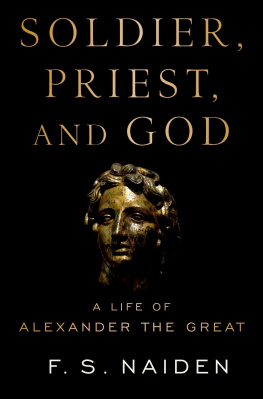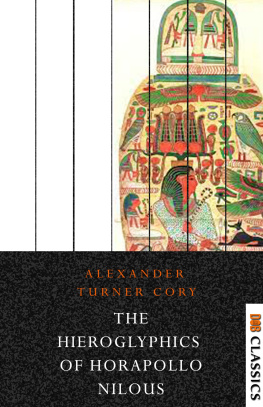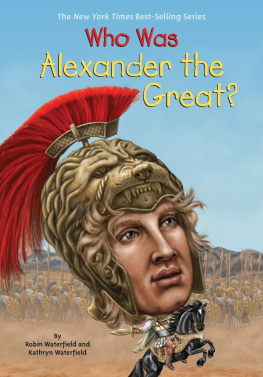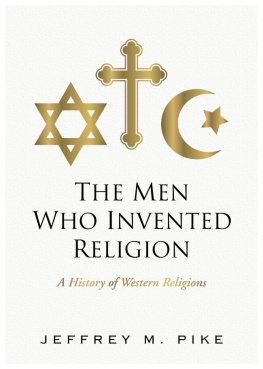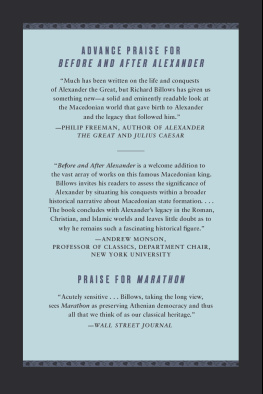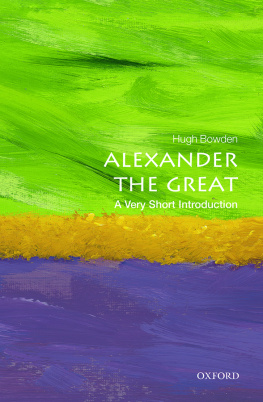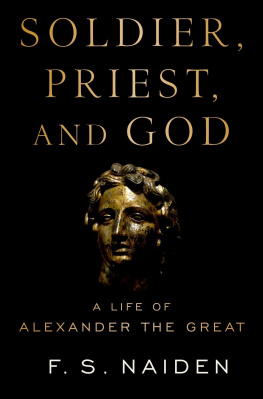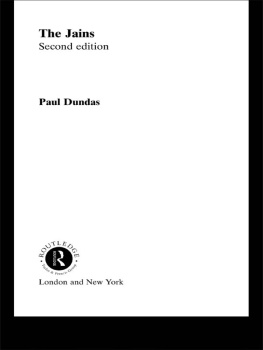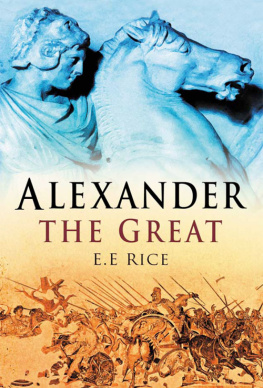this book owes much to audiences at New York Universitys Institute for the Ancient World, the University of California at Berkeley, the University of North Carolina at Chapel Hill, the University of Reading, Tulane University, Washington and Lee University, and Camp Schwab, United States Marines, Okinawa, who all heard lectures of mine on Alexander. I also thank audiences at the conventions of the Association of Ancient Historians, the Society for Classical Studies, and the Society for Military History, and I gratefully thank Stefan Vranka and Oxford University Press for shepherding this book to publication. For work on the maps thanks go to the Ancient World Mapping Center, especially director Richard Talbert, and to the Loeb Classical Library Foundation, which defrayed the cost.
Special thanks for comments, corrections, or suggestions go to Eugene Borza, Andrew George, Peter Green, Waldemar Heckel, Julith Jedamus, Joseph Manning, Francesca Rochberg, Robartus Van der Spek, Andrew Stewart, Richard Stoneman, Dorothy Thompson, Christopher Tuplin, and Everett Wheeler. I cannot adequately thank Ann Loftin, who copyedited most of the manuscript, except to say to her, as I would to each reader I have named, that the errors are mine and the felicities yours, insofar as they are not treasures deposited by centuries of tradition.
in 336 bc , the twenty-year-old Alexander succeeded his father, Philip, as king of the Macedonians, a rural Balkan people. Within a decade or so, a tale spread that Zeus and not Philip was his father. This tale was no more improbable than what happened in the meantime. Alexander and his army had overthrown the Persian Empire, which stretched from Asia Minor to India by way of Egypt. Bigger things have happened, such as the spread of Christianity and Islam, but more slowly. It took several centuries for Jesuss followers to spread his message across the Roman Empire, and followers of the Prophet Muhammad fought for nearly 200 years to spread Islam from Arabia to Spain and Central Asia.
Whatever we may think of Alexanderwhether great or only lucky, a civilizer or a sociopathwe do not regard him as a religious leader. We do not expect that much religion from a military commander. Before deciding when to cross the English Channel in 1944, General Eisenhower consulted meteorologists, not diviners. He encouraged his men with prayerful words, but he accepted enemy surrenders without ceremony and assigned the burial of the dead to chaplains. Alexander depended on diviners scrutinizing sheep livers to learn when to cross the Hellespont and the Indus. Along with prayerful words, Alexander made a display of hacking sacrificial animals to death. When enemies surrendered to him, he often obliged them to perform a ritual of supplication. Rather than assign the dead to chaplains, Alexander conducted funerals himself. Every dead comrade could turn into a friendly or unfriendly ghost, a being to be pleased or placated.
Religion was much more than these rituals. Temples were also treasuries, so religion affected war finance. Many rituals were very public events, so religion affected diplomacy and the administration of conquered territory. Religion provided legitimacy, and so it affected the solidarity felt among soldiers and the loyalty of subjects.
Religion dominated warfare because gods dominated everything. The Indus River was a god, and Zeus controlled the weather. Zeus also watched over suppliants, and he blessed a special religious fraternity, called the cult of the companions, to which Alexander and his subordinates belonged. Alexander claimed Heracles and Zeus as ancestors. In this sort of world, atheism was virtually impossible, and religious freedom was a risk no community would take. If the gods abandoned a community, an eclipse might pluck the sun or moon out of the sky, a hostile river might leap out of its bed, or an earthquake pitch a city into the sea.
All ancient commanders played religious parts, but Alexander played the most. He uttered or inspired the most prayers and made the most sacrifices, and he did so in the most places, languages, and rituals. We may think of him as the Pope, the Holy Roman Emperor, and the head of the Church of England, all in one.
Piety did not make Alexander overly scrupulous. As a priest, he mostly observed festival days on which fighting was forbidden, but he sometimes found religious reasons to ignore festival days and fight anyway. Told by a seer to defeat the enemy by the end of the month, he lengthened the month. Told not to sacrifice in a temple, he besieged the city where the temple stood, and persevered until he captured the temple and made the sacrifice, even thoughor just becausethe city was Tyre, the Manhattan of the ancient world.
When Alexander used religion astutely, he and his army prospered. At the start of his reign in Macedon he rallied his late fathers companions, and in neighboring Greece he gained kudos by refurbishing temples and sponsoring festivals. In Egypt he performed the ceremonies needed to be pharaoh and thus became a god as well as a priest. Babylon surrendered to him partly because he agreed to become a sacred king of another kind. All over the Levant, he demoralized enemies and pacified subjects by worshipping as the locals did.
When Alexander neglected or mismanaged religion, he and his army suffered. The farther he got from the Mediterranean, where he knew some of the gods and had a feel for others, the less skill he displayed, and the more men he killed or lost. In Iran, where he refused to be crowned and even destroyed a shrine, resistance against him mounted. In India, the Buddhists, Jains, and Hindus baffled him, and he killed them by the hundreds of thousands. Then his officers, men he regarded as companions of a religious kind, rebelled against him and forced him to abandon his campaign of conquest.

